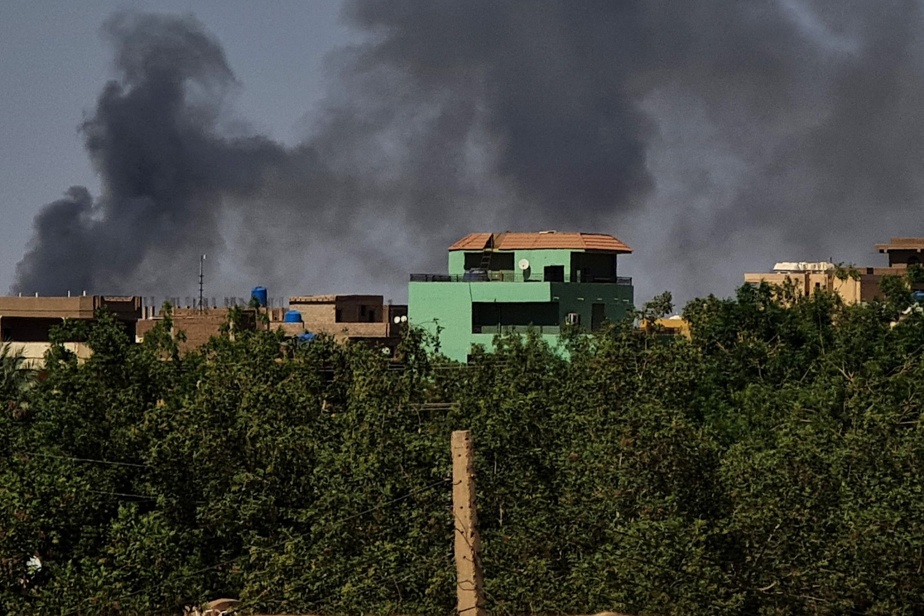(Khartoum) Fighting in Sudan between the military and paramilitaries vying for power raged Friday in Khartoum and showed no sign of abating despite threats of US sanctions.
On the 21st day of the conflict, airstrikes and explosions continued to rock different neighborhoods of the capital, especially near the airport, despite promises of a truce, witnesses told AFP.
The fighting between the army led by General Abdel Fattah al-Burhane, and the Rapid Support Forces (FSR) of General Mohamed Hamdane Daglo, have since April 15 killed around 700 people, according to the NGO ACLED which lists the victims. of conflicts.
Among them are an “incredibly” high number of children, according to the UN, in the country where 49% of the inhabitants are under the age of 18.
“The tragedy […] must end,” pleaded US President Joe Biden, waving the threat of sanctions against “individuals who threaten the peace,” without naming anyone.
The country of 45 million people only emerged in 2020 from two decades of American sanctions imposed on the military-Islamist dictatorship of General Omar al-Bashir, overthrown by the army under pressure from the streets in 2019 after thirty years of power.
In a putsch in 2021, Generals Burhane and Daglo ousted the civilians with whom they had shared power since the fall of Mr. Bashir. But afterwards, they were divided on the integration of the FSR in the army. Since then, nothing seems to be able to reconcile the two men who accuse each other of violating successive truces.
The RSF have yet to react to Wednesday’s announcement of a seven-day truce brokered by neighboring South Sudan and accepted by the military. On Friday, the RSF said it had agreed to a truce of just three days, negotiated through US-Saudi mediation.
Director of US Intelligence Avril Haines said a “protracted” conflict is to be expected because “both sides believe they can win militarily and have little reason to come to the negotiating table.”
The fighting has left more than 5,000 injured, displaced at least 335,000 people and pushed 115,000 others into exile, according to the UN, which is calling for 402 million euros to help the country, one of the poorest in the world. world.
The UN warns that 860,000 people, Sudanese, but also many South Sudanese returning to their country, could cross the borders in the coming months.
“Over 56,000 people” have arrived in Egypt, according to the UN, “over 12,000” in Ethiopia and “30,000 in Chad”.
Afdal Abdel Rahim is waiting to cross into Egypt. “When the war started, with shelling and airstrikes,” she told AFP, “we left our homes and fled to Wadi Halfa,” the last town before Egypt where thousands of Sudanese fleeing the war are crowding.
In Darfur, in the western border of Chad, civilians have been armed to participate in clashes mixing soldiers, paramilitaries and tribal or rebel fighters, according to the UN.
The NGO Norwegian Refugee Council (NRC), whose premises have been looted, counts “at least 191 dead, dozens of homes burned and thousands displaced” in this region ravaged in the 2000s by a conflict that made approximately 300,000 dead and 2.5 million displaced according to the UN.
Witnesses reported Thursday fighting in El-Obeid, 300 km south of the capital.
In the violence-spared coastal city of Port Sudan, another 30 tonnes of aid arrived on Friday. The UN and more and more NGOs are trying to negotiate the delivery of these cargoes to Khartoum and Darfur where hospitals and humanitarian stocks have been looted and bombed.
As diplomatic initiatives multiply in Africa and the Middle East, the military has pleaded for “African solutions to the continent’s problems”, while welcoming US-Saudi mediation.
General Burhane’s emissary was in Addis Ababa on Thursday. Cairo announced that they had spoken to the two rival generals on the telephone.
On Sunday, Arab foreign ministers will meet to discuss the “Sudanese file”, in which they support different camps, a senior diplomat told AFP.
The military has pledged to “appoint an envoy to negotiate a truce” with the rival camp, under the aegis of “the presidents of South Sudan, Kenya and Djibouti”, in a country yet to be determined.
The FSRs indicated that they are in contact with organizations and representatives from many countries and organizations.

